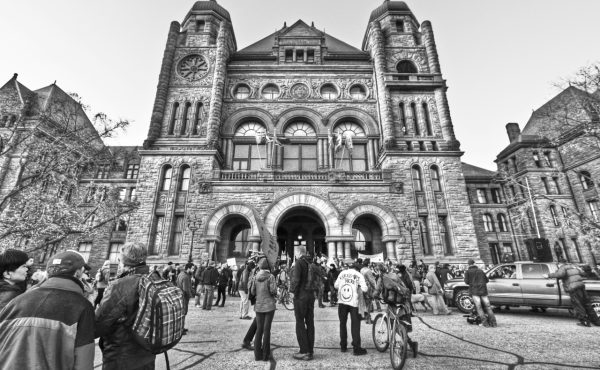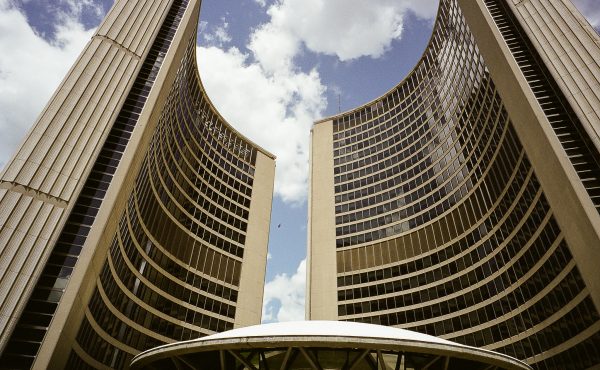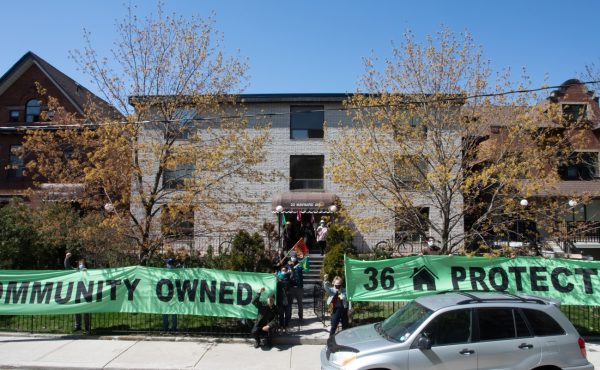Those grinding and rattling sounds you’ve been hearing in recent weeks could have come from a pre-Halloween party, but the source of the clamour has been even scarier for jumpy mid-term politicians: the horrifying prospect of actually telling Torontonians they’re going to have pay for all the enlightened city-building decisions being made in their/our name.
In recent speeches and reports, city manager Peter Wallace has continued to amp up the dreaded revenue tools debate, which is smashing forcefully over Mayor John Tory’s low-tax redoubt. Next week, council must decide to enter into a multibillion-dollar cost-sharing deal with the province for Smart Track and operating costs for the LRT lines, and do so without knowing where, exactly, the green will come from, if not, as the mayor said yesterday, property tax hikes.
A much-anticipated and suspiciously delayed report form Wallace, on a long-term financial strategy for the City, is supposed to land in January 2017, right in the middle of that mosh-pit otherwise known as the 2017 budget negotiations. The strategy ostensibly aims to force the politicians to address the $30 billion in future capital requirements that council has opted to support but not fund, as well as the chronic operating shortfalls ritually solved with duct tape and dabs of model glue.
The latest set of combatants to enter this arena convened, at the invitation of midtown councillor Joe Mihevc, in the Chestnut Hotel/Residence Tuesday morning for a sort-of off-the-record discussion dubbed “the circle of city builders.” Their agenda: how to foster a favourable political climate that will allow Tory to do the leaderly thing and persuade council (and Torontonians) that they need to be taxed more for the greater urban good.
The participants included a familiar roster of 30 civil society activists, planners, and others worthies, as well as downtown councillor Joe Cressy. The session reminded me a bit of the heady early days of the Toronto City Summit Alliance (TCSA, a.k.a. Civic Action), which Tory and the late David Pecaut established in 2003 to shift public opinion about… the financial shortfall facing the city! In fact, a Civic Action-ista was present at yesterday’s session (as were a few other TCSA alumni), although no one in attendance was so rude as to point out the irony.
After Mihevc provided a brief briefing of the city’s financial tribulations (complete with Wallace’s suggestive iceberg metaphor), the group broke into small discussion clusters, whose members dutifully reported on their conclusions. The easily achieved consensus was that the climate of opinion needed to be shifted so residents would understand that the city is at a “crossroads,” with one route leading to decline and the other to investments in good things, like better transit and housing. Oh yes, and that therefore we’ll have to pay for them.
By deploying savvy private-sector style marketing, personalized stories and a mindful approach to the importance of equity, especially in the suburbs, the participants explained, this high-minded re-framing of the issue will cause the political clouds to part.
Residents will not only accept the idea that council needs to hike taxes and impose more fees, but also embrace the prospect. At which point, all our tax-averse mayor has to do is shake the fiscal fruit off the tree and then file his papers for a glorious re-election at the hands of enlightened voters.
The meeting petered out with no evidence of next steps, beyond a call for op-eds and word spreading.
While Mihevc’s effort seems well-intentioned, and may even be part of some other strategy, I think it’s reasonable to ask whether the premise has any utility at all. It seems to me that such civil society coalitions have been farming this field for a long, long time, with not much to show for their efforts.
There’s no shortage of talk about the need for adequately funded municipal services, the transit deficit, the housing catastrophe, and on and on. Civic Action a four years ago ran a campaign to highlight the personal impact of traffic congestion, as have other organizations, including the City’s own planning department. There have been countless studies and position papers on productivity loss, housing adequacy, revenue tools, poverty reduction, and the way other countries fund, well, everything urban. Tory, in fact, produced some of these in his pre-mayoral life.
And yet….
My impolite question is why anyone’s wasting time on fighting yet another air war. I’d rather the participants, especially the elected officials, focus on the ground war of council politics and the hard-headed business of cobbling together a coalition of votes around a package of revenue tools that closes the fiscal gap, achieves various policy goals (equity, environment, etc.), and doesn’t load up all the costs onto a single demographic.
That’s how David Miller got council to establish the vehicle registration tax and the land transfer tax back in 2008. He spent his political capital on a problem that needed to be solved. While Rob Ford famously repealed the former as one of his first acts in office, the latter continues to generate huge dividends. Yes, real estate agents and home buyers still moan and complain. But the sky didn’t fall.
As Cressy noted during a break, the challenge is not to advocate for revenue tools in a general sense, but rather to set a specific target – e.g., $500 million per year – and then work backwards to get there. What’s less clear is whether anyone on council is prepared to spearhead a coalition-building process that will involve the sort of trade-offs the left doesn’t much like, such as privatizing Toronto Hydro or other asset sales.
After the meeting, planner Ken Greenberg picked up on Cressy’s point by saying that groups such as these should focus on developing a handful of permutations of revenue tools that will address the shortfall. Proposition, as the late Jack Layton liked to say, not opposition.
The tactical significance of such an exercise is simple: if Tory refuses to broker a deal because he’s praying that Kathleen Wynne or Justin Trudeau will bail him out, others on council should be prepared to offer alternatives, not just more lofty rhetoric about the importance of investing.
But that means politicians like Mihevc and Cressy, or others on council who are concerned about the submerged portion of the iceberg, actually have to embark on the hard work of building a political consensus around a specific set of revenue tools that are currently available to council. (More talk about advocating for options not allowed under the City of Toronto Act, such as municipal sales tax, indicates a lack of seriousness, in my view.)
They must also be prepared to figure out how to dangle the threat of a lost council vote over the mayor’s head. (Those with long memories will recall that Miller almost nearly failed in his first bid to win approval for new revenue tools, and ended up referring the motion until he managed to get his council ducks in a row.)
Mihevc himself acknowledged that recent attempts to get council to select from a menu of revenue tools failed because the various factions couldn’t agree on which ones to support and the competing proposals lost on the floor. As he warned afterwards, “We’re going to get zero unless there’s a solid body of people who say, ‘Make it happen, Mr. Mayor.’”
He meant the general public. But the reality is that there are already many Torontonians who feel that way, and there are just as many, if not more, who won’t be persuaded because no one wants more taxes, no matter how sunny the arguments.
If they’re serious, council’s revenue tools advocates need to spend the next few months focusing with laser intensity on identifying the trade-offs that will produce a council coalition with critical mass. Only then can they show Tory that if he continues to refuse to take responsibility for figuring out how to pay for the billions in promises he’s made as mayor, others will step in and do it for him.






2 comments
Dear ex-Mayor #RobFord & current fool Mayor John Tory. Thanks 4 nothing. Both ur legacies are going to prove to be ones of inadequacy and complete ineptitude.
John,
Why is it beyond the pale to throw aspects of this back at the voters themselves to get direction? For example: City of Toronto housing houses 10% of the city’s population. A further 10% are on waiting lists for it (I assume that everyone one the waiting lists lives within the city). These rents are massively subsidized for what is provided, meaning there’s a lack of incentive to get out of public housing other than… the capital stock is horribly decrepit and verging on “not fit to house people in.”
It will take somewhere north of a billion dollars, which the city doesn’t have, to put in place all the needed repair, which will presumably allow the city to continue subsidizing rent for the lucky 10%. Of course, there’s no evidence the cycle will end: because the housing stock will still suffer wear-and-tear damage (at least) and isn’t bringing in enough revenue on its own to keep itself maintained.
So… why not put it to the public: “The current situation isn’t sustainable. Do you support (1) raising residential property taxes to repair public housing and continue subsidizing rent for 10% of the city; or (2) largely selling off the assets and getting the city out of housing.”
I see no reason why other big decisions to determine which way to steer the boat when it comes to raising billions of dollars can’t also be put to the public.